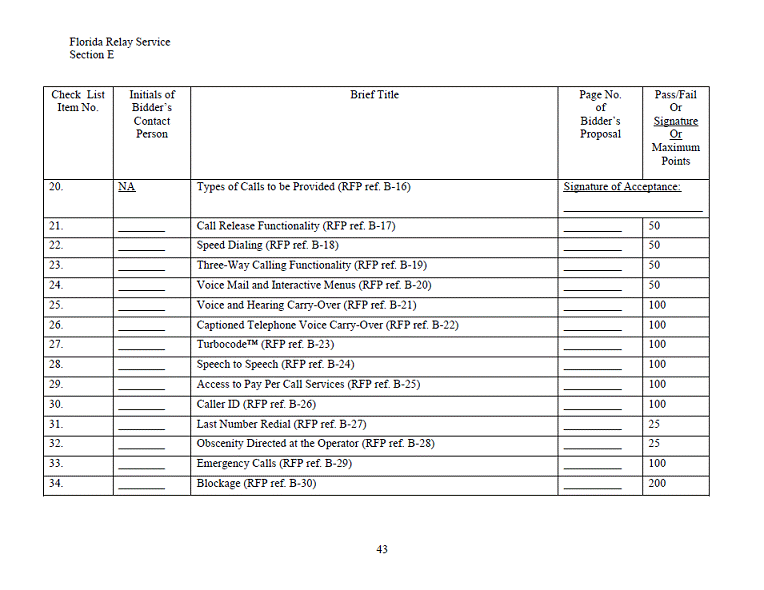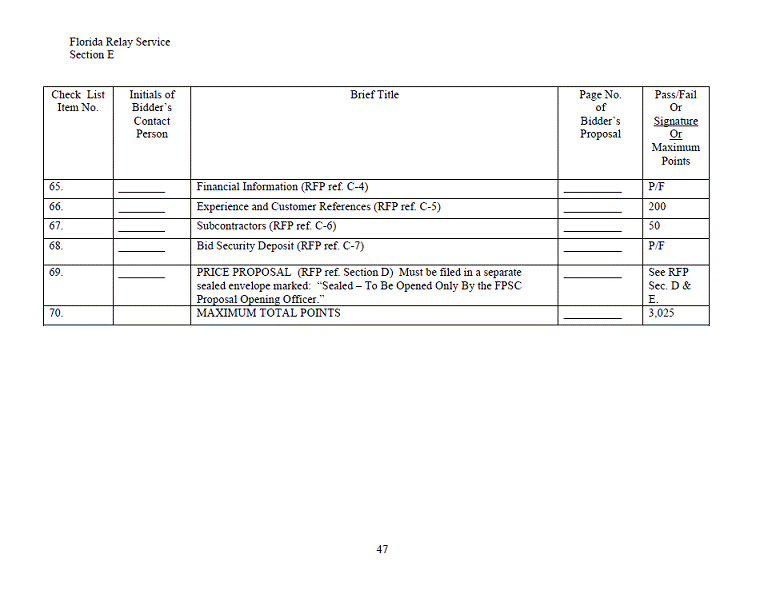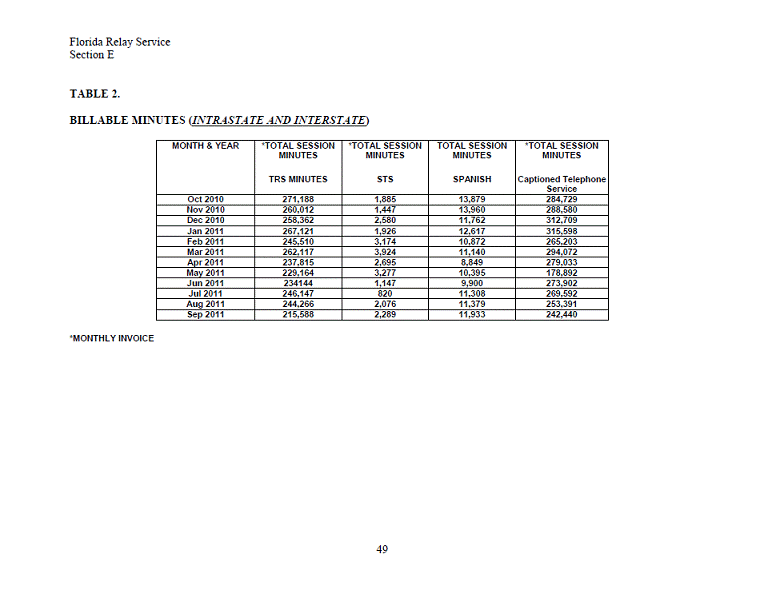




































Changes in appearance and in display of formulas, tables, and text may have occurred during translation of this document into an electronic medium. This HTML document may not be an accurate version of the official document and should not be relied on.
For an official paper copy, contact the Florida Public Service Commission at contact@psc.state.fl.us or call (850) 413-6770. There may be a charge for the copy.
|
|
|
||
|
DATE: |
|||
|
TO: |
Office of Commission Clerk (Cole) |
||
|
FROM: |
Division of Regulatory Analysis (Bloom) Office of the General Counsel (Miller) |
||
|
RE: |
|||
|
AGENDA: |
11/22/11 – Regular Agenda – Interested Persons May Participate |
||
|
COMMISSIONERS ASSIGNED: |
|||
|
PREHEARING OFFICER: |
|||
|
SPECIAL INSTRUCTIONS: |
|||
|
FILE NAME AND LOCATION: |
|||
Pursuant to Section 427.704(1), Florida Statutes (F.S.), the Florida Public Service Commission (FPSC or Commission) must establish, implement, promote, and oversee the administration of a statewide telecommunications access system to provide access to telecommunications relay services by persons who are deaf, hard-of-hearing, speech impaired or others who communicate with them. Pursuant to Section 427.704(3)(a), F.S., the Commission must select the provider of the telecommunications relay services through a request for proposals (RFP).
On April 26, 2011, the Commission approved a Request for Proposals (RFP) to provide a telecommunications relay service system in Florida. The RFP was issued and three bidders submitted proposals. On September 20, 2011, the FPSC voted to reject all bids and to issue a new RFP. The FPSC electronically posted a Notice of Intent to Reject All Bids, and no protests were received.
This recommendation proposes that the Florida Public Service Commission approve the attached revised RFP (Attachment A) to provide a telecommunications relay service system in Florida. If approved, the RFP will be issued on the Vendor Bid System, with the bidders’ proposals due by December 22, 2011. The tentative schedule calls for the Commission to select a provider in early 2012, and for the provider to begin furnishing service by June 1, 2012.
The RFP describes a relay service which will be in compliance with both the Florida Telecommunications Access System Act (TASA) and the federal Americans with Disabilities Act (ADA). The RFP mandates many features including: 24 hour a day service every day of the year, answering time and blocking standards, confidentiality conditions, procedures for relaying a call which gives substantial control to the user over how the call is handled, communications assistant and staff requirements, provisions for complaint resolution and consumer input, and other features. In addition, the RFP allows a bidder to provide unsolicited features as part of its basic relay service.
The Commission shall award the contract to the bidder whose proposal is the most advantageous to the state, taking into account the following considerations in Section 427.704(3)(a), F.S.
a. The appropriateness and accessibility of the proposed telecommunications relay service for the citizens of the state, including persons with hearing and/or speech loss.
b. The overall quality of the proposed telecommunications relay system.
c. The charges for the proposed telecommunications relay service system.
d. The ability and qualifications of the bidder to provide the proposed telecommunications relay service system as outlined in the RFP.
e. Any proposed service enhancements and technological enhancements which improve service without significantly increasing cost.
f. Any proposed inclusion of provision of assistance to deaf persons with special needs to access the basic telecommunications system.
g. The ability to meet the proposed commencement date for the Florida Relay Service (FRS).
h. All other factors listed in the RFP.
Each bidder will be required to submit its bid, including its proposed charges per billable minute, assuming a three-year contract would be awarded with the option of four one-year extensions. The price proposal must be submitted in a sealed envelope separate from the technical proposal.
The RFP provides for a point system for evaluating the proposals. A weight of 60 percent will be given to the technical aspect of the proposal and a weight of 40 percent will be given to the price aspect of the proposal. The Proposal Review Committee, consisting of FPSC staff and an advisory committee member will evaluate each proposal. Then a recommendation for award will be brought back to the Commission.
History of TASA
The Telecommunications Access System Act of 1991 (TASA) became effective May 24, 1991, and is found in Chapter 427, Part II of the Florida Statutes. TASA was developed in response to two needs. The first was the need for permanent funding for the distribution of specialized telecommunications equipment for people with hearing and/or speech loss (TDDs, volume control telephones, etc.). The second motivation for TASA was the need for a telecommunications relay system whereby the cost for access to statewide basic telecommunications services for persons who have a hearing loss or speech impairment is no greater than the amount paid by other telecommunications customers.
The ADA required telephone companies to develop a relay system for both interstate and intrastate calls by July 1993; however, TASA mandated that a statewide telecommunications relay service be provided earlier, beginning June 1, 1992. TASA required the development of a statewide relay service that would be capable of being certified by the Federal Communications Commission (FCC). TASA provides funding for the distribution of specialized telecommunications devices and intrastate relay service through the imposition of a surcharge of up to $.25 per landline access line per month. (Accounts with over 25 lines are billed for only 25 lines).
The FPSC has overall responsibility for implementation and oversight of the system. The local exchange companies (LEC), both incumbents and competitive local exchange companies, and shared tenant providers have the responsibility of collecting the surcharge and submitting it to the Administrator. Florida Telecommunications Relay, Inc. (FTRI), a nonprofit corporation formed by the LECs, was named by the FPSC to serve as the TASA administrator. The provider is the entity that, as a result of being awarded the contract resulting from the RFP, will provide relay service.
The TASA advisory committee is a group of up to ten individuals recommended by various organizations representing both the telephone industry and individuals that are deaf, hard of hearing, and speech or dual sensory impaired. The advisory committee’s role is to provide input to both the FPSC and the FTRI on the development and operation of the relay system. Staff met with the advisory committee on October 29, 2011, and obtained its input. A bidder’s workshop was held October 25, 2011, to review the draft RFP.
The current contract with Sprint expires May 31, 2012. Thus, the RFP needs to be approved for issuance soon so that the process can be completed and a contract can be signed in March 2012, allowing the selected provider sufficient time to establish and set up the system by June 1, 2012.
Discussion of Issues
Issue 1:
Should the Request for Proposals be issued?
Recommendation:
Yes. The Commission should issue the Request for Proposals, as set forth in Attachment A. (Bloom, Miller)
Staff Analysis:
The RFP was drafted to describe as specifically as possible the relay service that should be provided. The RFP includes services currently being provided and is compliant with all the Federal Communications Commission certification requirements. The RFP also includes the Advisory Committee’s recommendations.
As mentioned in the case background, the Commission issued an RFP on April 26, 2011, but ultimately rejected all bid proposals on September 20, 2011. At the September 20, 2011 Commission Conference, the Commission instructed staff to explore substantive changes to the RFP issued on April 26, 2011, including more realistic weighting of basic relay and captioned telephone, and more objective criteria. The revised RFP makes the following substantive changes from the initial RFP:
(a) More objective criteria
Staff changed a number of provisions to Signature of Acceptance, rather than for points or Pass/Fail. Examples of those provisions include whether the bidder has FCC Authority to Provide Service, the Term of Contract, the Scope of Services, and Languages Served. (See subsection C.1. of Attachment A for language about the Signature of Acceptance.) This removes some of the subjective review for items. It also streamlines the process by reducing the amount of information to be provided by the bidders and the amount of time for the evaluators to spend on these items.
(b) A more realistic weighting of basic relay and captioned telephone (Captel)
In the previous RFP, there was a weighting of basic relay at 35 percent and Captel at 5 percent. This had also been the case in the RFP from 2004. However, the minutes of usage have changed since that 2004 time period so that the minutes of use for basic relay and Captel are almost equal. Staff changed the weighting to 21.3 percent for relay and 18.7 percent for Captel to reflect actual 2010 minutes of use. (Attachment A, p. 40 of the RFP)
(c) Lower liquidated damages
The amount of liquidated damages is revised for failure to meet answer time requirements from a cap of $25,000 per day to $5,000 per day. The bidders suggested the liquidated damages cap be reduced as a cost savings measure. (Attachment A, p. 32 of the RFP)
(d) Eliminate exceptions to the RFP
In order to keep a level playing field, the ability for the bidders to enumerate exceptions to the RFP is eliminated. Allowing bidders to enumerate exceptions created confusion as to how to handle any exceptions provided, and how to evaluate such different offerings.
(e) Restrictions on Communications
Language is added that would restrict any outside party communications with the Commission from the time the staff recommendation for the award of the contract is released to the time the Notice of Intent to award is electronically posted. This would include any communication by an outside party with the Proposal Review Committee (PRC) Chair, with Commissioners, and with docket filings. (Attachment A, p. 10 of the RFP)
(f) Cure for breach of the contract
Language is added that would allow the provider 14 days to cure a breach of the contract. If the breach is not cured within 14 days, the FPSC may, by written notice to the provider, terminate the contract upon 24 hours notice. (Attachment A, p. 13 of the RFP)
(g) Performance Bond
Language is amended to permit the renewal of the bond on an annual basis rather than maintaining the same bond over the duration of the contract. A bond must, however, be maintained over the duration of the contract. This issue was raised at the bidders’ conference as a potential cost saving measure. (Attachment A, p. 29 of the RFP)
(h) Elimination of Offering Optional Services
In an effort to reduce any confusion in the evaluation process and to ensure that all bids are considered in the most objective manner possible, language relating to the provision of certain optional services has been deleted.
Other Changes Considered
Staff also considered changing the weighting between the technical component of the bid proposal and the pricing component from 60 percent and 40 percent to 50 percent and 50 percent. However, a member of the TASA Advisory Committee expressed concern about shifting emphasis away from the technical portion of the contract, including quality of service. Pursuant to Section 427.704(3)(h), F.S., the Commission is required to consider the advice and counsel of the advisory committee in the development of the request for proposals. Staff thus left the current weighting of 60 percent technical and 40 percent price.
Staff reviewed the concept of mandating a call center in Florida or adding points for it. Issues have been raised as to whether Chapter 427, F.S., accommodates economic development. At the same time, a Florida call center could make it easier for on-site testing and to more adequately monitor the services. A Florida call center would come at an added cost to wireline consumers. A Florida call center has been required in the past. However, the recent experience was that the selected provider opted not to provide the center in the optional year of the current relay contract because the additional cost was significant. If the Commission determines that a Florida call center fits within the guidelines in the statutes, the Commission would need to determine whether it is a mandatory or optional service and how many points, if any, to assign for the Florida-specific center. Currently, staff has not included the call center in the RFP as a mandatory service or for additional points, based on the uncertainty of the cost, benefits, and the issues raised regarding the statute.
Staff considered awarding points for the offering of optional services. This would have permitted awarding points for the offering of additional foreign languages, a Florida call center, or other options. The Commission has provided additional points for a Florida call center in the past though not in the existing contract. However, the practice was discontinued after the company under contract could no longer continue to offer the center on an optional year without a significant price increase. Bidders may choose to provide services in addition to those specifically required by the RFP, but staff is reluctant to award points for options that could add cost without a clear benefit in the quality of the service provided.
Staff also considered awarding points for redundant coverage throughout the country. Redundant coverage nationally is one way to ensure continuous service. If there is a hurricane or natural disaster in an area affecting one region of the country where a center is located, a center in another area may be able to handle the relay traffic. This criteria was raised by a bidder at the bidders’ workshop. However, the current contract and the proposed RFP requires that provisions be made to prevent or mitigate interruption or impairment of relay service. Therefore, staff does not believe it is necessary to award points for redundancy.
Staff considered the options of requiring separate price proposals for with and without a call center in Florida, but believes this may place too much ambiguity into the process and would entail the Commissioners being placed in the role of evaluators.
One party raised the possibility of adding some form of an efficiency factor in the pricing proposal to capture the matter of some companies having a quicker processing time. Staff considered the proposal, however, within the current timeline, and staff did not see a simple neutral manner in which to incorporate an efficiency measure.
Staff considered forecasting the basic telecommunications relay and Captel relay minutes, as suggested by one of the bidders at the bidders’ workshop. However, staff believes that this approach would be no more accurate than basing the RFP on historical minutes of usage.
Accordingly, staff recommends that the Commission should issue the Request for Proposals, as set forth in Attachment A.
Issue 2:
Should this docket be closed?
Recommendation:
No. (Miller)
Staff Analysis:
Rather than a FPSC order being issued on this contractual matter, the RFP will be electronically posted on the Vendor Bid System at:
http://myflorida.com/apps/vbs/vbs_www.main_menu
pursuant to Section 120.57(3), F.S. This docket should remain open throughout the life of the contract with the provider selected to begin providing service on June 1, 2012.











